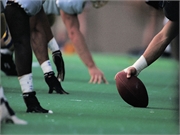After NFL Career Ends, Black Players Suffer More Health Woes Than Whites
By Alan MozesHealthDay Reporter

FRIDAY, Aug. 14, 2020 (HealthDay News) -- Despite the fame and fortune that comes with being an elite athlete, new research finds that Black NFL players are much more likely than their white peers to be in poor health once they retire.
After surveying nearly 3,800 former pro football players, investigators found that Black players say they are 50% more likely to struggle with chronic disabling pain than white players, and 36% more likely to have serious memory and attention problems. They also reported a 90% greater propensity towards suffering some sort of physical disability.
"We found that former players who identified as Black/African American were much more likely to report impairment in their day-to-day activities," said study author Andrea Roberts, a senior research scientist with the Harvard T.H. Chan School of Public Health in Boston.
Impairment, explained Roberts, was defined as an inability to engage in routine recreational activities, shopping, housework and/or socializing, due to a combination of physical and mental health issues, alongside enduring pain.
"We were surprised that the differences in our study were so large," she added, given that NFL players -- regardless of race -- tend to have the advantages of higher social status, income and education than the general public.
But racism "is experienced by U.S. minorities even if they are or were in high-status occupations. [And] racism is a form of chronic stress, which has long-term negative effects on physical and mental health," Roberts explained.
"In addition, in the U.S. there is a history of discrimination against minorities in provision of health care, which continues to the present time and often results in poorer outcomes for minorities," she added.
That point was echoed by Kendra Lee, editorial director of Black Health Matters, an information website focused on health and wellness issues in the Black community.
Not surprised by the survey results, Lee stressed that "prior to going pro, athletes of color were subject to the same disparity-riddled health care system as folks who don't play professional sports."
And that, she said, often means Black players grow up with a "lack of access to care, lesser quality care, higher rates of asthma, neighborhoods with lead in the pipes and the paint," compounded by poor nutrition and a greater exposure to pollution.
Another problem: Once in the NFL, medical care is typically aimed at keeping players healthy while playing -- "not necessarily at what was best for their well-being," said Lee.
In addition, Roberts noted that "historically, Black players have been paid far less than white players."
And that, Lee said, means that while the biggest non-white NFL stars may acquire enough stature and resources to insulate them from health disparities in retirement, most won't.
The survey participants were all retired players, ranging in age from 24 to 89. About 1,400 were Black, 2,200 were white, and almost 110 were Native Americans, Asian and/or Hawaiian/Pacific Islander.
All were asked to discuss their health histories in terms of five broad categories: physical functioning, pain, thinking function, depression and anxiety.
Players of color who were not Black also fared significantly worse than white players on all fronts, except when it came to impaired physical function.
But Black players were found to fare worse across the board, including a reported 70% greater risk for depression and a 50% greater risk for anxiety, compared with white players. The findings held up even after accounting for a player's age at the time they were surveyed, how long they played for the NFL, their position on the team, smoking and drinking habits, weight status, concussion and surgery histories, and pain medication use.
Broadly speaking, the findings "really highlight how health disparities permeate every aspect of U.S. society," said Roberts, a fact that she believes has come to the fore as the pandemic has unfolded.
As for Lee, she noted that "of course the disparities for society at large are worse" than for celebrated, world-class athletes.
But that, she said, begs the question: "If former professional athletes with seemingly more economic cushion still face a mountain of disparities, what hope is there for regular old folks?"
The findings were published in the Aug. 4 issue of Annals of Epidemiology.
More information
There's more information on health and race at U.S. Centers for Disease Control and Prevention.

The news stories provided in Health News and our Health-E News Newsletter are a service of the nationally syndicated HealthDay® news and information company. Stories refer to national trends and breaking health news, and are not necessarily indicative of or always supported by our facility and providers. This information is provided for informational and educational purposes only, and is not intended to be a substitute for medical advice, diagnosis, or treatment.

